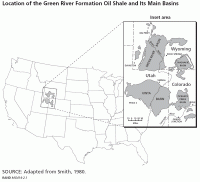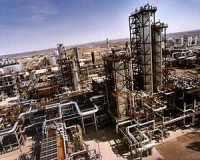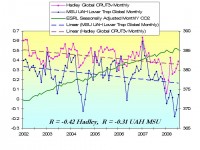By Lawrence Solomon, Financial Post
Never before in human history has energy been accessible in greater abundance and in more regions, never before has mankind had more energy options and faced a brighter energy future. Take oil, the scarcest of the major energy commodities. In the Americas, proven oil reserves have increased from 170 billion barrels to 180 billion barrels over the last two decades, according to the 2008 Statistical World Review from British Petroleum. In Europe and Eurasia, proven oil reserves almost doubled, from 76 billion barrels to 144. Africa’s proven oil reserves did double, from 58 billion barrels to 117. Even the Asia Pacific region, where China and India are reputed to be sucking up everything in sight, has increased its proven reserves. And the Middle East, the gas tank of the world, shows no sign of slowing down—its reserves soared by almost 200 billion barrels, from a whopping 567 billion barrels to a super-whopping 756.
Bottom line for the world: an incredible 36% increase in oil reserves during the two decades that saw the greatest globalization-spurred oil consumption in the history of mankind. And that doesn’t include the 152 billion barrels in proven oil reserves obtainable from Canada’s tar sands. Is there any reason to doubt that the next two decades won’t build on the steady growth of the last two? These oil reserves aren’t the end of it. These figures—for the year ending December 2006—represent oil that’s not only known to be available, but also economic at 2006 prices using 2006 technology. Since prices have soared in the last year, and technology has improved too, BP’s annual assessment for the 2007 year will show greater proven oil reserves still.
But this is still not the end of it. Unconventional oil reserves are now in play. In 2005, the Rand Corporation estimated that the oil shale in America’s Green River Formation, which covers portions of Colorado, Utah and Wyoming, contains 1.5 to 1.8 trillion barrels of oil, with as much as 1.1 trillion barrels of oil recoverable, an amount comparable to the reserves of four Saudi Arabias. Oil shale becomes recoverable at $95 a barrel, it determined. With oil now trading at $140 a barrel, oil shale exploitation is now very much economic.

See larger image here
Then there’s Canada’s tar sands, with its even greater potential--estimates of the total reserves that may be available top two trillion barrels, or eight Saudi Arabias.

Tar oil production at Athabasca Tar Sands, Alberta, Canada. (Photo courtesy Encyclopedia of Earth)
The world is awash with exploitable energy, both renewable and non-renewable. Availability is not at issue and never has been. Read more about theswe are renewable sources here.
Lawrence Solomon is executive director of Energy Probe and Urban Renaissance Institute.
By Paul MaCrae, False Alarm
Britain’s Hadley Centre for Climate Prediction and Research is in a spot of bother at the moment. On the one hand, the Hadley Centre is a firm believer in the hypothesis that humans are the main cause of global warming and that we’re heading toward catastrophe. It even devotes several of its web pages to waving a nagging finger at those foolish enough or unprincipled enough to believe otherwise.
On the other hand, the Hadley Centre, as part of the British Meteorological Office, is also churning out data showing that the planet isn’t warming at the moment, and hasn’t for the past 10 years or so. What to do? As principled scientists, the Hadley staff can’t cook the books so the temperature figures fit the hypothesis, although at least one other major climate centre is doing its best to keep its figures matching the hypothesis. On the other hand, if the general public got the idea that maybe the planet wasn’t warming after all, despite what it’s been told so often, the people might rebel against punitive carbon taxes and go back to their materialist-loving ways. The Hadley Centre’s solution is a combination of spin-doctoring and let’s hope nobody notices. You find the spin in its finger-wagging admonitions that we mustn’t take this non-warming trend at all seriously. Just temporary. Planet’s still warming. Move along; nothing to see here.
Hadley notes “Earth’s climate is complex and influenced by many things, particularly changes in its orbit, volcanic eruptions, and changes in the energy emitted from the Sun. It is well known that the world has experienced warm or cold periods in the past without any interference from humans”. So, humans are causing “most of the warming” at the moment, but not warming in the past, and there are many other causes of warming as well, all natural, and all, one would think, a lot more powerful - solar orbit changes, volcanoes, variations in solar energy - than anything humans could throw at the planet.
It was warm from 1850 to 1940, too, but in 1940 the planet cooled for 30 years. However, this cooling can’t happen again, according to the Hadley Centre. How does it know? Because its computers tell it so - the same computers that couldn’t predict the recent 10 years of non-warming. But why isn’t the planet warming now? After all, humans are “driving” the climate, aren’t we? Well, not quite. As the Hadley Centre tells us “The recent slight slowing of the warming is due to a shift towards more-frequent La Nina conditions in the Pacific since 1998. These bring cool water up from the depths of the Pacific Ocean, cooling global temperatures.” (incidentally, “slight slowing of the warming” is an unsual way of describing “no warming").

See large image here
So the oceans are driving this non-warming through an La Nina (a cold current), overriding our human-caused carbon dioxide. Maybe humans aren’t as powerful a “driving” force as the Hadley Centre would like us to believe after all. And if humans aren’t the main cause of cooling, maybe we’re not the main cause of warming, either. Read more here.
By Lawrence Solomon, Financial Post
Planet Earth is on a roll! GPP is way up. NPP is way up. To the surprise of those who have been bearish on the planet, the data shows global production has been steadily climbing to record levels, ones not seen since these measurements began. GPP is Gross Primary Production, a measure of the daily output of the global biosphere—the amount of new plant matter on land. NPP is Net Primary Production, an annual tally of the globe’s production. Biomass is booming. The planet is the greenest it’s been in decades, perhaps in centuries.
Until the 1980s, ecologists had no way to systematically track growth in plant matter in every corner of the Earth—the best they could do was analyze small plots of one-tenth of a hectare or less. The notion of continuously tracking global production to discover the true state of the globe’s biota was not even considered. Then, in the 1980s, ecologists realized that satellites could track production, and enlisted NASA to collect the data. For the first time, ecologists did not need to rely on rough estimates or anecdotal evidence of the health of the ecology: They could objectively measure the land’s output and soon did—on a daily basis and down to the last kilometre.
The results surprised Steven Running of the University of Montana and Ramakrishna Nemani of NASA, scientists involved in analyzing the NASA data. They found that over a period of almost two decades, the Earth as a whole became more bountiful by a whopping 6.2%. About 25% of the Earth’s vegetated landmass—almost 110 million square kilometres—enjoyed significant increases and only 7% showed significant declines. When the satellite data zooms in, it finds that each square metre of land, on average, now produces almost 500 grams of greenery per year.
Why the increase? Their 2004 study, and other more recent ones, point to the warming of the planet and the presence of CO2, a gas indispensable to plant life. Read more why that may be coming to an end and why any efforts to sequester the atmospheric carbon, mistakenly called a pollutant by alarmists and environmentalists may have very costly unintended consequences here.


